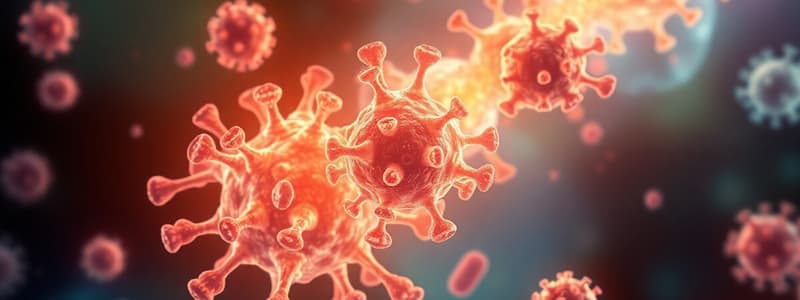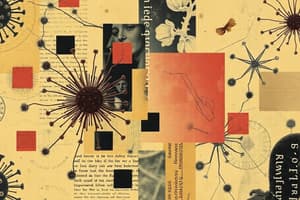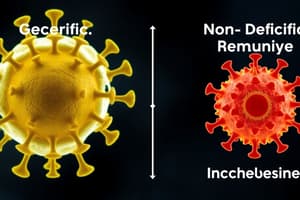Podcast
Questions and Answers
Which characteristic is associated with innate immunity compared to specific immunity?
Which characteristic is associated with innate immunity compared to specific immunity?
- Provides immunological memory
- Responds in the same way to any invader (correct)
- Responds to specific antigens
- Involves T and B cells
Which of the following is a critical function of antigen presentation?
Which of the following is a critical function of antigen presentation?
- Activating complement cascades independently of antibodies
- Producing antibodies by plasma cells without T cell help
- Directly neutralizing pathogens without immune cell involvement
- Enabling T cells to recognize and respond to antigens (correct)
What is the primary role of T helper cells (CD4) in humoral immunity?
What is the primary role of T helper cells (CD4) in humoral immunity?
- Directly killing infected cells
- Recognizing MHCI on infected cells
- Activating B cells to enhance antibody production (correct)
- Suppressing the immune response to prevent autoimmunity
Which antibody is typically the first to be produced during a primary immune response?
Which antibody is typically the first to be produced during a primary immune response?
Which process involves antibodies clumping antigens together, facilitating their inactivation?
Which process involves antibodies clumping antigens together, facilitating their inactivation?
In what way does neutralization by antibodies protect against pathogens?
In what way does neutralization by antibodies protect against pathogens?
What is the key function of cytotoxic T cells (CD8)?
What is the key function of cytotoxic T cells (CD8)?
Which of the following characterizes a secondary immune response compared to a primary immune response?
Which of the following characterizes a secondary immune response compared to a primary immune response?
How is passive immunity typically acquired?
How is passive immunity typically acquired?
What is the role of regulatory T cells in the immune system?
What is the role of regulatory T cells in the immune system?
Which statement best describes the relationship between innate and specific immunity?
Which statement best describes the relationship between innate and specific immunity?
What is the primary function of opsonization?
What is the primary function of opsonization?
Which type of antigen requires T cell help to stimulate a strong antibody response by B cells?
Which type of antigen requires T cell help to stimulate a strong antibody response by B cells?
What is the role of cytokines in the immune response?
What is the role of cytokines in the immune response?
Which antibody type is most commonly found in mucosal surfaces?
Which antibody type is most commonly found in mucosal surfaces?
What is the significance of MHCII molecules in adaptive immunity?
What is the significance of MHCII molecules in adaptive immunity?
Antibody-dependent cell-mediated cytotoxicity (ADCC) enhances the activity of which immune cell?
Antibody-dependent cell-mediated cytotoxicity (ADCC) enhances the activity of which immune cell?
Which of the following is directly involved in the process of apoptosis induced by cytotoxic T cells?
Which of the following is directly involved in the process of apoptosis induced by cytotoxic T cells?
How does the immune response to T-independent antigens differ from the response to T-dependent antigens?
How does the immune response to T-independent antigens differ from the response to T-dependent antigens?
Which antibody can cross the placental lining?
Which antibody can cross the placental lining?
Which cells are included under Antigen Presenting Cells (APCs)?
Which cells are included under Antigen Presenting Cells (APCs)?
What type of antigens do T helper cells recognize?
What type of antigens do T helper cells recognize?
What two main forms can B cells differentiate into?
What two main forms can B cells differentiate into?
What does activation of complement lead to?
What does activation of complement lead to?
What is the function of agglutination?
What is the function of agglutination?
What is a characteristic of passive immunity?
What is a characteristic of passive immunity?
What response would occur from a secondary immune response?
What response would occur from a secondary immune response?
IgE is most associated with?
IgE is most associated with?
Where are MHCI receptors found?
Where are MHCI receptors found?
Through what method do cytotoxic t cells kill infected cells?
Through what method do cytotoxic t cells kill infected cells?
Which cell type is important during pregnancy?
Which cell type is important during pregnancy?
What is the first response when no memory exists for a pathogen?
What is the first response when no memory exists for a pathogen?
What antibody is transferred in domestic animals mostly in the colostrum but also transplacentally?
What antibody is transferred in domestic animals mostly in the colostrum but also transplacentally?
What is a cytokine specific to species and short living?
What is a cytokine specific to species and short living?
What is the role of IgD?
What is the role of IgD?
Which of the following is an action of antibodies?
Which of the following is an action of antibodies?
What does Amnestic response do?
What does Amnestic response do?
What cells are involved in Specific Immunity?
What cells are involved in Specific Immunity?
Flashcards
Antigen
Antigen
A substance that triggers an immune response.
Antibody
Antibody
A protein produced by the body to neutralize or destroy antigens.
Agglutination
Agglutination
Clumping of particles or cells.
Apoptosis
Apoptosis
Signup and view all the flashcards
Cytokines
Cytokines
Signup and view all the flashcards
Opsonization
Opsonization
Signup and view all the flashcards
Neutralization
Neutralization
Signup and view all the flashcards
Humoral Immunity
Humoral Immunity
Signup and view all the flashcards
Cell-Mediated Immunity
Cell-Mediated Immunity
Signup and view all the flashcards
Primary Immune Response
Primary Immune Response
Signup and view all the flashcards
Secondary Immune Response
Secondary Immune Response
Signup and view all the flashcards
Active Immunity
Active Immunity
Signup and view all the flashcards
Passive Immunity
Passive Immunity
Signup and view all the flashcards
Innate Immunity
Innate Immunity
Signup and view all the flashcards
Specific (Adaptive) Immunity
Specific (Adaptive) Immunity
Signup and view all the flashcards
Specific Response
Specific Response
Signup and view all the flashcards
Amnestic Response
Amnestic Response
Signup and view all the flashcards
T cells and B cells
T cells and B cells
Signup and view all the flashcards
Antigen Presentation
Antigen Presentation
Signup and view all the flashcards
Extra Cellular Antigens
Extra Cellular Antigens
Signup and view all the flashcards
APCs (Antigen-Presenting Cells)
APCs (Antigen-Presenting Cells)
Signup and view all the flashcards
MHCII
MHCII
Signup and view all the flashcards
T helper cells (CD4)
T helper cells (CD4)
Signup and view all the flashcards
T dependent antigens
T dependent antigens
Signup and view all the flashcards
T cell Activates B cells
T cell Activates B cells
Signup and view all the flashcards
B cells
B cells
Signup and view all the flashcards
T independent antigens
T independent antigens
Signup and view all the flashcards
Plasma cells
Plasma cells
Signup and view all the flashcards
IgM
IgM
Signup and view all the flashcards
IgG
IgG
Signup and view all the flashcards
IgA
IgA
Signup and view all the flashcards
IgE
IgE
Signup and view all the flashcards
Agglutination
Agglutination
Signup and view all the flashcards
Opsonization
Opsonization
Signup and view all the flashcards
ADCMC
ADCMC
Signup and view all the flashcards
Neutralization
Neutralization
Signup and view all the flashcards
Activation of complement
Activation of complement
Signup and view all the flashcards
Cell Mediated Immunity
Cell Mediated Immunity
Signup and view all the flashcards
Cytotoxic t cells (CD8)
Cytotoxic t cells (CD8)
Signup and view all the flashcards
Regulatory/suppressor T Cell
Regulatory/suppressor T Cell
Signup and view all the flashcards
Study Notes
- Specific immunity involves responses to specific antigens
Terminology
- Important terms to be familiar with include antigen, antibody, agglutination, opsonization, apoptosis, neutralization, cytokines, humoral vs cell-mediated immunity, primary vs secondary immune response, and active vs passive immunity
Innate vs Specific Immunity
- Innate immunity uses the same process for every invader and is not specific
- Innate immunity occurs immediately with invasion or tissue damage
- Innate immunity does not provide memory
- Inflammation, phagocytosis, and complement are part of innate immunity
- Neutrophils, macrophages, and natural killer cells are involved in innate immunity
- Specific immunity is a specific response to a recognized antigen
- Specific immunity is acquired over time
- Specific immunity provides memory, known as the amnestic response
- Specific immunity produces antibodies
- T cells and B cells are key players in specific immunity
- Specific and innate immunity rely on each other in the immune response
- Antigen presentation by dendritic cells is one instance of the two systems interacting
- Antibody-dependent complement cascade and natural killing are other instances of the two systems interacting
Humoral Immunity
- Extracellular antigens are presented to B cells and T cells
- Antigen-presenting cells (APCs) include macrophages and dendritic cells
- B cells can directly bind to an antigen and present it
- MHCII (major histocompatibility complexes) are found on the surface of B cells and APCs
- T helper cells (CD4) recognize MHCII on B cells and APCs
- Helper T cells (CD4) interact with B cells
- T-dependent antigens are proteins
- T cells release cytokines
- T cells activate B cells, resulting in clonal expansion and enhanced phagocytosis
- B cells can become plasma cells or memory B cells
- T-independent antigens are polysaccharides
- B cells can be activated independently of T cells, but the immune response is weaker and doesn't provide memory
- Polysaccharides like LPS (endotoxin) can trigger this response
- B cells turn into plasma cells and produce antibodies
- Types of antibodies include IgM, IgG, IgA, IgE, and IgD
- IgM is the first antibody present in early immune responses
- IgG is the most common antibody, appears later in infection or in secondary exposure responses, and can pass through the placental lining
- IgA is found in mucosal surfaces
- IgE mediates allergies and hypersensitivities
- IgD acts as a receptor on B cells
- Antibodies perform agglutination, opsonization, ADCMC, neutralization, and complement activation
- Agglutination clumps antigens to inactivate them
- Opsonization identifies antigens for phagocytosis/lysis
- ADCMC (antibody-dependent cell-mediated cytotoxicity) enhances NK cell activity against large pathogens
- Neutralization prevents microbe attachment, stopping toxin function
- Activation of complement leads to complement action through the classical pathway
Cell Mediated Immunity
- Infected cells (intracellular pathogens) and cancerous cells are attacked by this immunity
- Cytotoxic T cells (CD8) recognize MHCI receptors on infected cells
- This induces apoptosis and releases interferons
- Leads to memory T cells
- Other types of T cells include regulatory/suppressor cells
- Suppressor cells help prevent immunity to self-antigens
Primary and Secondary Immunity
- Primary immunity is the initial response, with no previous exposure
- It is slower and relies on IgM first, then IgG
- Specific to each antigen
- Secondary immunity (anamnestic response) happens with subsequent exposures
- Natural immunity or vaccination can induce it
- It is actively acquired through exposure
- Specific to each antigen
Passive Immunity
- Passive immunity provides a temporary supply of antibodies
- It is limited in time and amount, and uses the mother's memory
- It is transferred in domestic animals mostly in the colostrum, but also transplacentally (IgG)
- Can also directly provide antibodies in plasma or hyper-immune serum
Cytokines
- Cytokines are chemical messengers of communication, communicating by attaching to a receptor
- Cytokine storm is a severe immune reaction in which the body releases too many cytokines at one time
- Interferons are a cytokine specific to viruses and are short-lived
Studying That Suits You
Use AI to generate personalized quizzes and flashcards to suit your learning preferences.




